2024 Fall Update: Media, Tech and Democracy
A MESSAGE FROM OUR CO-CEOs
2024 has already been a momentous year for Free Press. We celebrated our 20th anniversary, helped restore Net Neutrality and released the results of a nationwide poll we commissioned to understand people’s views about media and technology in an election year. And in this perilous moment for democracies around the world, we’re working harder than ever to combat hate and disinformation and fight for the kind of journalism that gives people the news and information they need to thrive.
As Free Press enters its third decade, we remain committed to our mission of promoting a more just and equitable media system, one that strengthens our democracy.
Your generous support keeps Free Press and our sister organization, Free Press Action, independent from the government, political parties and the industries we track — and allows us to work solely for the public interest. Read on to learn what you’ve helped us accomplish so far this year.
Onward,
Craig Aaron and Jessica J. González

Courtney Morrison
CELEBRATING OUR 20TH ANNIVERSARY
In March, Free Press marked two decades of wins at a gathering in Washington, D.C., that brought together current and former colleagues, allies, and officials from the Federal Communications Commission and the Federal Trade Commission. The event was a beautiful reminder that Free Press’ mission is so much bigger than any one of us, and that we can enact great change when we work together to build energy and excitement for our ideas.

Nick Moreland Photography

Former FCC Commissioner Michael Copps (second from left), FCC Chairwoman Jessica Rosenworcel (center) and Free Press Co-CEO Craig Aaron (second from right) with other attendees
Nick Moreland Photography

Free Press Senior Foundation Partnerships Director Sara Longsmith (center)
Nick Moreland Photography

Free Press board members Martha Fuentes-Bautista (left) and Brandi Collins-Dexter (center) with Free Press Co-CEO Jessica J. González
Nick Moreland Photography
COMBATING HATE AND DISINFORMATION IN TECH
In the lead-up to Democracy Day on Sept. 15, a Free Press-led coalition of civil-rights, media-advocacy and tech-accountability groups announced the launch of Democracy Is …, an initiative that is calling on media and tech companies to prioritize truth over sensationalism, accountability over profits and democracy over division. The project is training journalists on how to cover extremism and helping members of the public identify and combat disinformation on social media. Democracy Is … has released multiple resources, including recommendations on how newsrooms can address electoral disinformation and a guide to how people can protect their First Amendment right to protest. The initiative has also held a series of events, including one on risks communities are facing this election cycle.
“Democracy Is … was founded on the premise that people power can disrupt institutional failings,” said Nora Benavidez, senior counsel and director of digital justice and civil rights. “We have brought together organizations with core recommendations that both media and tech companies should take to protect users and give people the information they need to participate fully in their communities and our democracy.”
This fall, disinformation aimed at Haitian communities in Ohio and Pennsylvania has led to people being targeted and harassed. In addition, false information targeted at Spanish-speaking Latinos has been proliferating over social media. As part of the Democracy Is … initiative, Free Press and the Latino Media Collaborative held a webinar, “Challenging Election Lies Targeting Latinos & Immigrants,” which highlighted how people can push back on racist narratives.
Throughout the year, Free Press laid important groundwork for Democracy Is … by bringing together allied organizations and educating lawmakers, newsrooms and advocates about what’s at stake. For example, in April, a Free Press-led global coalition of more than 200 civil-society organizations, researchers and journalists called on the biggest social-media platforms to strengthen their efforts to protect democratic elections worldwide in 2024. The coalition urged these companies to take six steps — including reinstating election-integrity policies and staffing up critical trust and safety teams — to curb misinformation. “Social-media companies must redouble their election-integrity efforts as generative AI has the potential to supercharge hate and lies that endanger democracy and public safety,” said Co-CEO Jessica J. González.
At a time when social-media platforms are trying to avoid any kind of public accountability, eight of the 12 companies responded to our letter with commitments to election-integrity measures — with nearly all of these companies committing to beefing up their non-English-language content-moderation efforts, flagging generative AI that aims to confuse or misinform people, and applying their rules equally to VIP accounts.
Free Press released Democracy Deferred: Social-Media Companies’ Meager Commitments to Election Integrity in 2024, an analysis of these responses. The report, which Nora Benavidez and Jessica J. Gonzàlez wrote, assesses these platforms’ readiness to address political disinformation, manipulation and hate on their networks. The analysis exposes how social-media platforms came up short in their plans to protect users and stem eroding trust in democratic institutions. Democracy Deferred sets forth a roadmap for how these companies can better protect voters, platform users and democracies everywhere. We will be tracking the companies’ actions and issuing another report after the election.
In July, Free Press Action Co-CEO Jessica J. Gonzàlez joined Sens. Ben Ray Luján and Alex Padilla for a Capitol Hill briefing to highlight the crisis of election disinformation in non-English languages — and to issue an urgent call for social-media platforms to beef up content moderation across all languages.
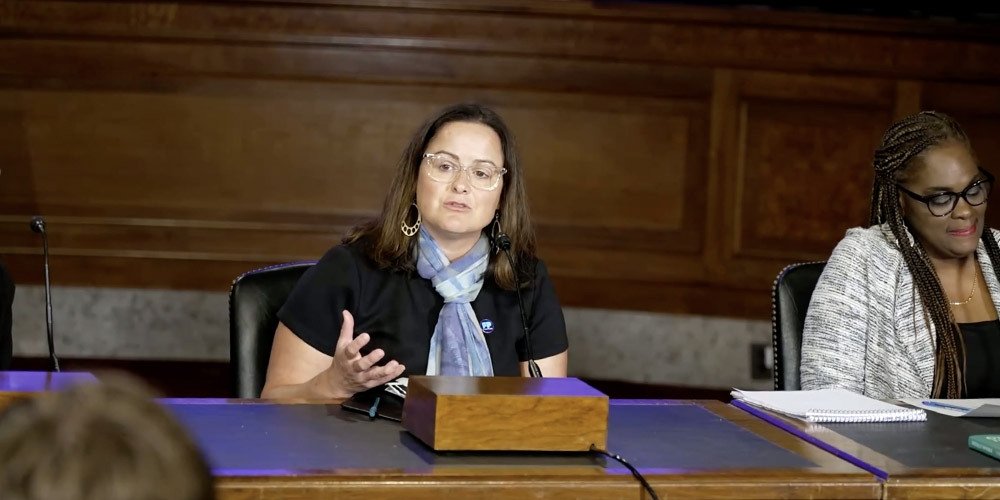
Free Press Action Co-CEO Jessica J. Gonzàlez at a Capitol Hill briefing
In August, a Free Press-led coalition of more than three-dozen civil-rights, consumer-rights and journalism organizations released a letter calling on news outlets to accurately and unapologetically report on U.S. elections and the state of our democracy. The letter describes best practices the media should adhere to during moments of crisis, violence and threats — and calls on newsrooms to place protection of our democracy over their own bottom lines.
ANALYZING AND AMPLIFYING GROUNDBREAKING RESEARCH
In May, we released the findings from a nationwide poll, which gauged public attitudes about media and technology in an election year. This survey shows that people in the United States believe the media system is failing to meet the civic needs of a functioning democracy. People are also highly concerned about privacy and their ability to access reliable and trustworthy information on local, national and global affairs. The poll, which Free Press commissioned and the African American Research Collaborative and BSP Research conducted, surveyed 3,000 people across the country. The survey oversampled AAPI, Black and Latino populations, allowing for a more detailed analysis of the usage and impact of old and new communications technology on people of color.
According to our findings, only 28 percent of all adults say they feel “very well informed” when voting in local elections. We also learned that 79 percent of people from across the racial and political spectrum are concerned that the information they’re seeing online is false, fake or a deliberate attempt to confuse. Meanwhile, 76 percent are concerned about encountering election misinformation, and 52 percent support increasing public funding to expand local and independent news — in other words, the kind of reporting that could debunk the flood of deceitful content.
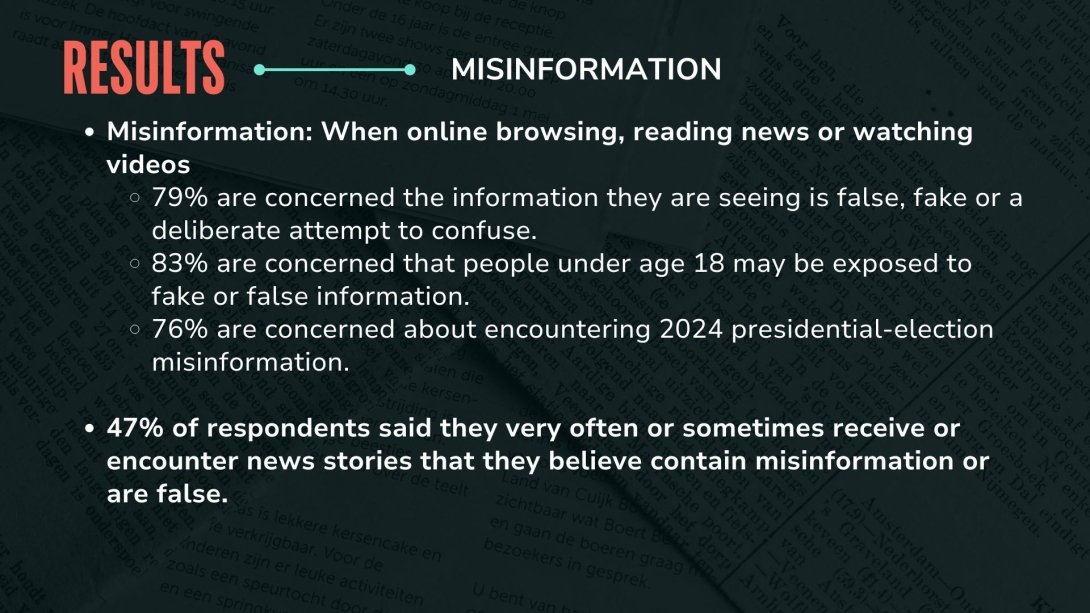
In July, we released an analysis of our findings about daily Spanish speakers. Our polling shows that Spanish speakers in the United States are even more likely than others to feel they do not have enough independent news sources to make informed voting decisions. The poll indicates that daily Spanish speakers are more likely to experience the negative impacts of online misinformation, affirming years of research that finds Latinos are ripe targets for bad actors.
SAFEGUARDING PRIVACY AND CIVIL RIGHTS — AND CONFRONTING AI ABUSES
In February, Free Press Action and a coalition of privacy, civil-rights and digital-rights groups sent thousands of constituent phone calls and petitions calling on lawmakers to cancel a floor vote to extend controversial surveillance powers under Section 702 of the Foreign Intelligence Surveillance Act. The pressure worked, and House leaders shelved the bill. Unfortunately, leaders brought the bill back for a vote in April, when it passed despite the public outcry. Section 702 will come up for another reauthorization in two years, and we will keep working to stop spying agencies from abusing people’s civil liberties and civil rights.
“This unconstitutional authority allows intelligence agencies to continue to sift through personal data even when those searches don’t relate to a warranted criminal investigation,” said Vice President of Policy and General Counsel Matt Wood. “This is an especially grave concern because recent administrations, both Republican and Democratic alike, have unjustly targeted people of color and political dissidents.”
Since 2021, Free Press Action has been urging Congress to pass the Fourth Amendment Is Not for Sale Act, which would restrict law enforcement and intelligence agencies from purchasing data on people in the United States without a warrant. Since the fall of Roe v. Wade — and the criminalization of abortion in more than 20 states — this practice is more dangerous than ever. In April, the House passed this bipartisan bill — the farthest the legislation has ever advanced.
“The privacy violations that flow from law-enforcement entities circumventing the Fourth Amendment undermine civil liberties, free expression and our ability to control what happens to our data,” said Policy Counsel Jenna Ruddock. “These impacts affect everyone who uses digital platforms that extract our personal information any time we open a browser or visit social media and other websites — even when we go to events like demonstrations and other places with our phones revealing our locations.”
In July, Free Press Action withdrew its support for the American Privacy Rights Act after House sponsors removed critical civil-rights protections. These provisions would have ensured that even when companies collect information for a necessary purpose, they are not allowed to use it to discriminate against individuals and communities. An earlier version of the bill contained many essential safeguards that Free Press Action had long advocated for.
In April, President Biden cited security concerns when signing into law a bill that would force TikTok’s Chinese owner, ByteDance, to divest its holdings of the site or face an effective ban in the United States. The law does nothing to protect people’s privacy or address the widespread manipulation users face across all platforms, including those owned and headquartered in the United States. Free Press Action asserts that instead of banning TikTok, lawmakers should pass a comprehensive federal privacy law that limits how all of these companies collect, store, analyze and sell our personal data. We joined an amicus brief arguing that the law violates the First Amendment by restricting Americans’ right to access information and media from abroad.
AI models are built and trained on decades of institutionalized discrimination and segregation. They perpetuate biases that create inequitable experiences for users. In September, Free Press Action supported the introduction of a bill, the Artificial Intelligence Civil Rights Act, that would help eliminate these kinds of biases from AI tools.
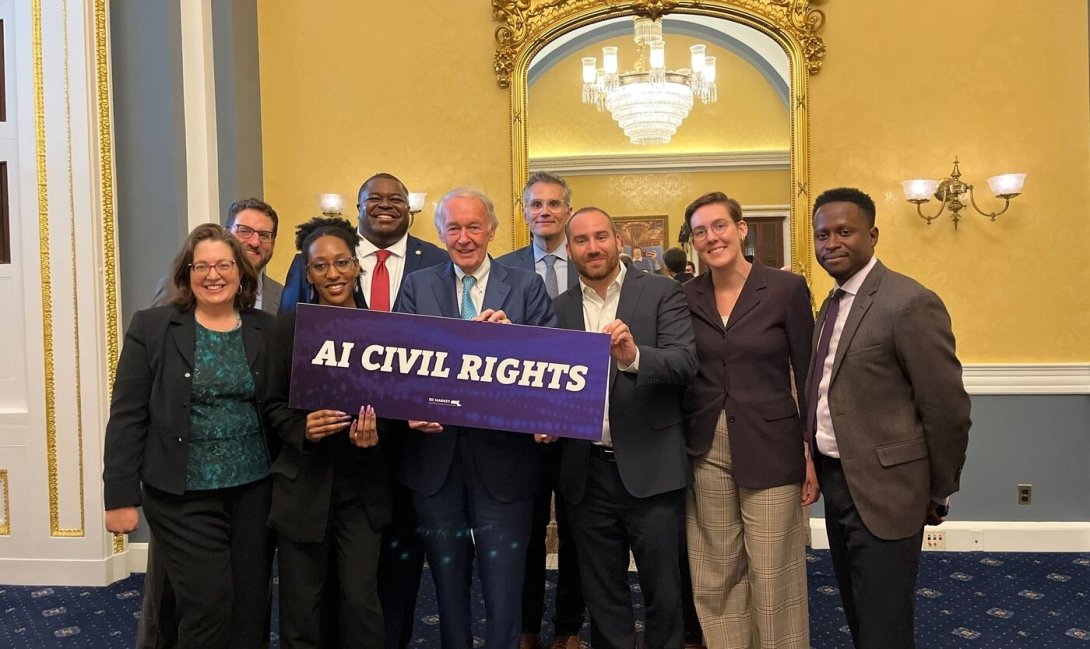
Free Press Action staff and allies with Sen. Ed Markey (center) at the introduction of the Artificial Intelligence Civil Rights Act
“Artificial intelligence is rapidly entering every corner of our lives — from access to education, health care and insurance to decisions made by the courts, police and immigration officials — with far too little public input or recourse when these systems cause real-world bias or harm,” said Co-CEO Craig Aaron, who spoke during a press conference about the bill alongside Sen. Ed Markey and civil-rights leaders. “We need to ensure that new tools and technologies aren’t used to exacerbate discrimination.”
At the Take Back Tech conference and elsewhere, Jenna Ruddock is raising awareness about the environmental impacts of data centers and their role in facilitating surveillance — and helping communities organize for solutions. As the growth of AI intensifies the harmful consequences of these centers, the need for regulation couldn’t be more stark.

Free Press Policy Counsel Jenna Ruddock (left) at the Take Back Tech conference
PROTECTING THE NET NEUTRALITY WIN
On April 25, Free Press celebrated a huge milestone when the FCC restored the Net Neutrality rules the Trump administration overturned. The agency also reinstated its Title II authority, giving it the power to protect people from internet service providers’ privacy invasions, promote broadband competition and deployment, and take action against hidden junk fees, data caps and billing rip-offs.
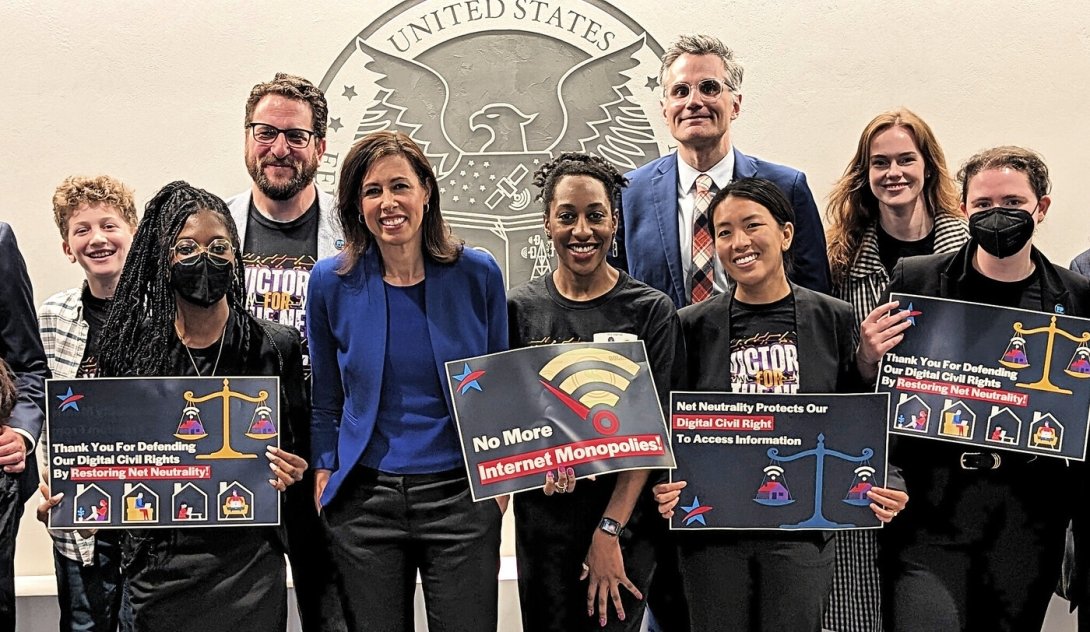
Free Press staffers and allies celebrated when the Biden FCC voted to restore Net Neutrality and Title II
This victory was years in the making, and our team worked hard to ensure the FCC’s order covered all the bases and closed all the loopholes. “Public support for Net Neutrality is overwhelming, and people understand why we need a federal watchdog to protect everyone’s access to the most essential communications platform of our time,” said Co-CEO Craig Aaron. “This is what democracy should look like: public servants responding to public sentiment, taking steps to protect just and reasonable services and free expression, and showing that the government is capable of defending the public interest.”
Almost immediately industry groups sued to block the FCC’s restored rules. In a setback for internet users, in August the U.S. Court of Appeals for the 6th Circuit granted the ISPs’ request to stay the implementation of these protections until the court conducts its full review of the case this fall.
Free Press is going to court to fight back. In September, we filed a brief with the 6th Circuit Court of Appeals alongside several allies in defense of the rules. “We’re confident in our case, even in light of recent Supreme Court decisions aimed at weakening federal agencies’ oversight,” said Policy Counsel Yanni Chen. “We’ve beaten back the ISPs’ flimsy claims in court before.”
CLOSING THE DIGITAL DIVIDE
Through both groundbreaking research and ongoing advocacy, Free Press Action has pushed decision-makers to recognize the need to make high-speed internet both affordable and available to everyone. In 2021, our work paved the way for the historic $65-billion investment in broadband in the infrastructure package that President Biden signed into law.
A remarkable $14.2 billion of that total was dedicated to the creation of the Federal Communications Commission’s Affordable Connectivity Program. The ACP, which launched in 2022, gave households living near the poverty line or enrolled in other federal-aid programs up to $30 per month for the internet package of their choosing — and $75 per month for people living on Tribal lands. Nearly 23 million households — which translates to 1-in-6 U.S. households — enrolled in the ACP.
There was a huge need for this program but the funding for it was limited. Free Press Action advocated for Rep. Yvette Clarke’s Affordable Connectivity Program Extension Act, which would have kept families connected through the end of 2024. We helped mobilize a coalition of 271 civil-society groups and local, state and Tribal governments to express their support for the bill. While a bipartisan majority of House representatives expressed support for the legislation, House leaders refused to bring it up for a floor vote. As a result, the ACP expired — adding more financial pressure to families already struggling to make ends meet, and disrupting internet access for many. Free Press Action is continuing to push for solutions — including long-term sustainability for the ACP — to this chronic broadband-affordability problem.
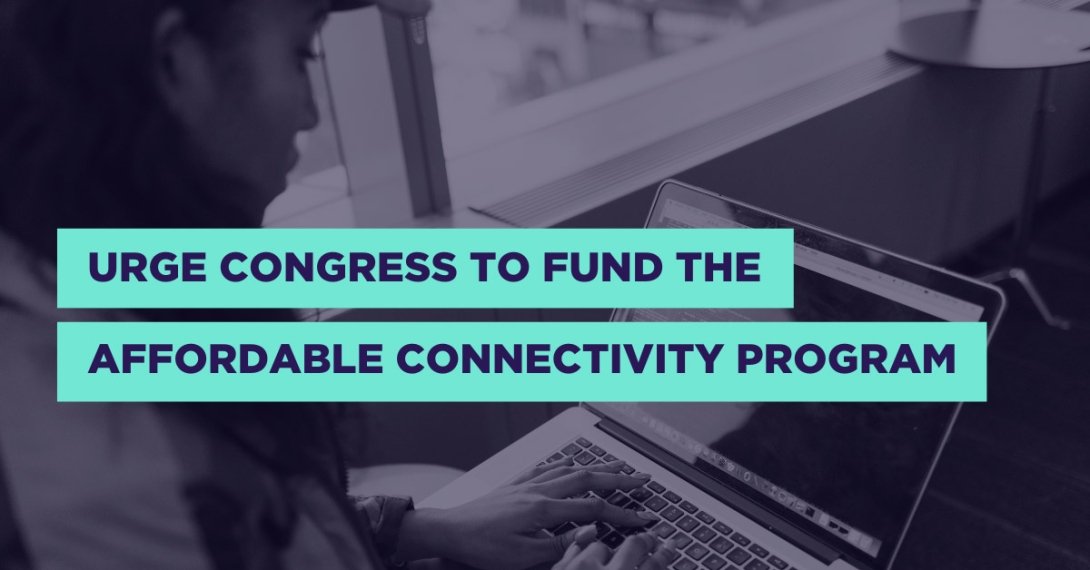
In September, Reps. Rashida Tlaib, Cori Bush and Jamaal Bowman reintroduced the Utility Justice Human Rights Resolution, which declares that access to broadband, water, power, heating and cooling are human rights. The resolution is the product of work with the Utility Justice Coalition, which Free Press Action helps lead.
“Equitable access to affordable and reliable high-speed internet, power and water is a necessity for people to survive and thrive,” said Internet Campaign Director Heather Franklin. “In the face of compounding existential crises, including human-driven climate change, no one — no matter who they are or where they live — should have to worry about their ability to call for help, communicate with loved ones, or safely turn on the lights or faucet.”
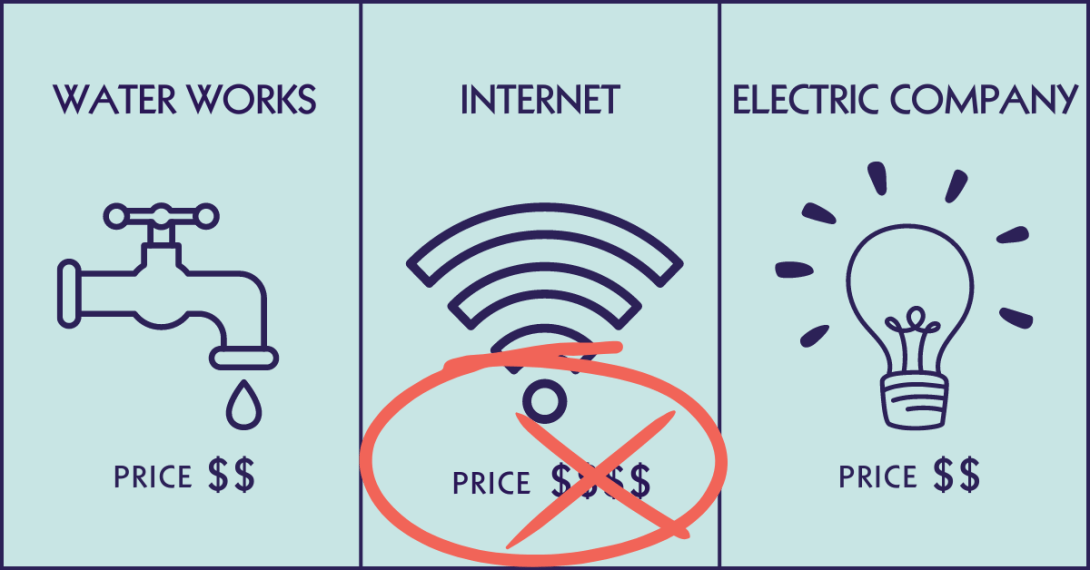
ORGANIZING FOR MEDIA REPARATIONS AND CULTURAL REPAIR
In October, Media 2070 worked with allies MediaJustice and Black River Life to bring the Black Future Newsstand to Chicago. This custom-built art installation — which debuted in Harlem in 2023 – invites people to consider the question “What does a media that loves Black people look, feel and sound like in a future where reparations are real?” Exploring the relationship between news, politics, racial narratives and the potential for creating a true democracy, the installation showcased Black-owned magazines, art and newspapers alongside coverage of Chicago’s political movements of the ’70s and ’80s.
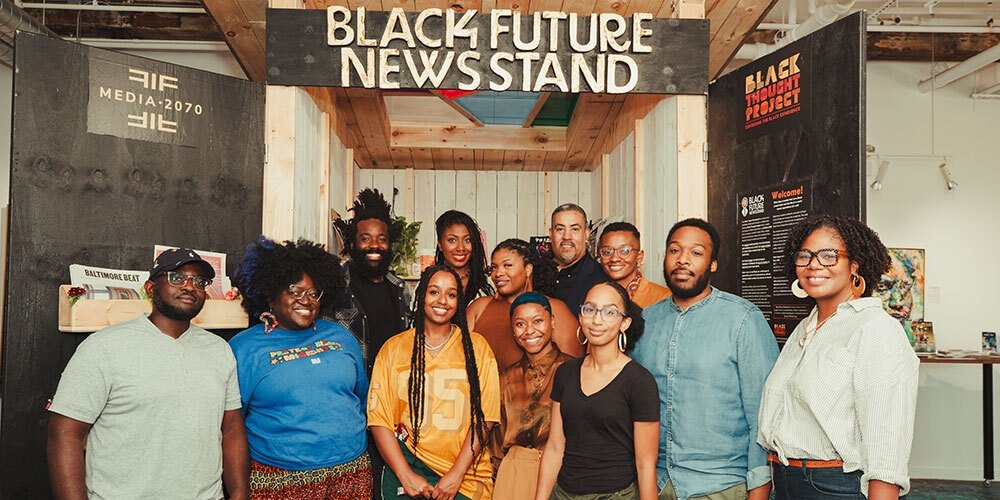
Media 2070 staff and allies gathered in front of the Black Future Newsstand installation in Chicago
Michael Lim
Presented as part of Race Forward’s Cultural Week of Action on Race and Democracy, Black Future Newsstand Chicago also included a panel discussion on the harms of pro-police propaganda. Earlier this year, the team previewed a screening of a forthcoming documentary about the Harlem version of the newsstand. Media 2070 will bring the exhibit to Los Angeles in spring 2025.
In September, Media 2070 began a new research project with the Charlotta Bass Journalism & Justice Lab at USC Annenberg, which studies and shares news stories and oral histories about Black social-justice trailblazers on the West Coast. The project will research both harmful and reparative news narratives concerning Black life and identity in Los Angeles. This research will contribute to a multimedia archive, “From Riot to Repair: Community Archives on Media and Narrative Power.” To kick off the collaboration, Media 2070’s Diamond Hardiman and Venneikia Williams gave a series of lectures to undergraduate and graduate journalism students at USC. In the spring, Media 2070 will return to Los Angeles for a week to unveil the project’s findings.
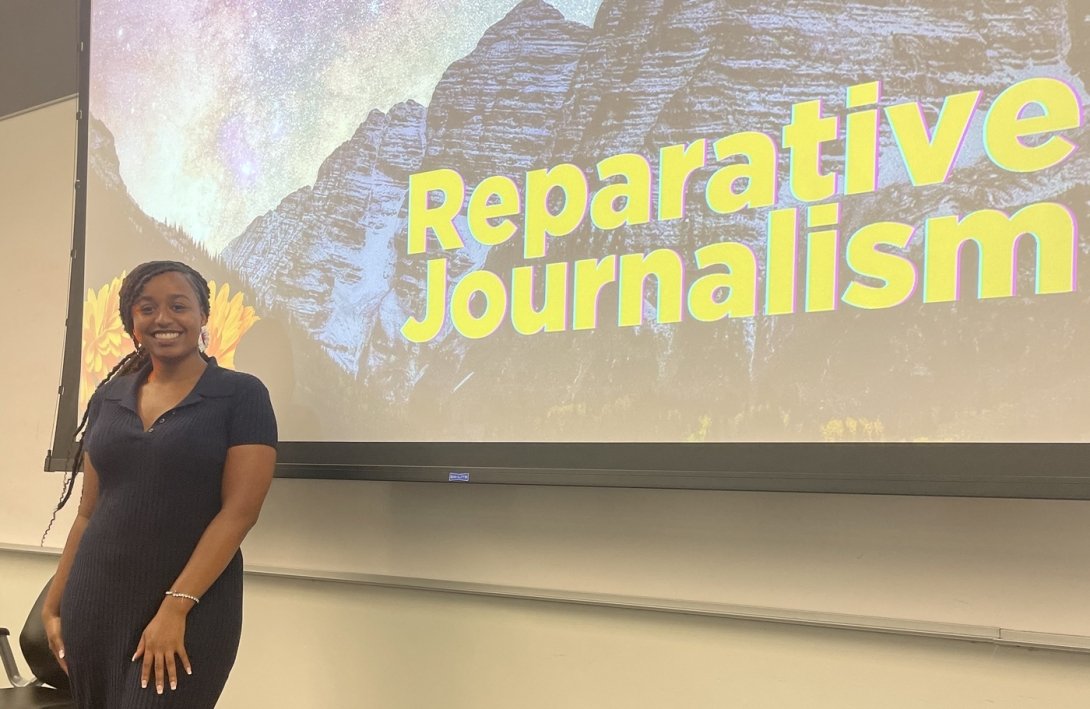
Reparative Journalism Program Manager Diamond Hardiman at USC Annenberg
Media 2070 is also continuing to shape the national debate about the need for media reparations. The project’s growing consortium of media-makers, artists, scholars and activists meets quarterly and has helped Media 2070 reach a broader range of audiences. During a well-received virtual press briefing the team delivered in January, Media 2070 and a panel of journalists, news leaders, activists and academics of color explored the vital need to build new systems that repair harm.
CRAFTING JOURNALISM POLICY
Since 2004, California has lost 25 percent of its newspapers, and many ethnic media outlets and nonprofit newsrooms are struggling to stay afloat. For the past two years, Free Press Action has been hard at work in the state to pass policies that will support community-centered newsrooms and keep people informed. But in late August, state lawmakers announced they had cut a deal with Google, hammered out behind closed doors, that sold both California’s communities and journalists short. While some newsrooms will benefit from this deal in the short term, it’s not a viable long-term solution.
Prior to this disappointing development, Free Press Action had rallied support behind a state Senate bill that would have imposed a fee on major tech platforms to help support the production of local news. The revenue generated by this fee, estimated to be roughly $500 million, would have given outlets an employment tax credit to cover a portion of employees’ wages. Thanks in part to Free Press Action’s support, the bill passed the state Senate in June. Unfortunately, in exchange for Google’s commitments, lawmakers shelved this legislation.
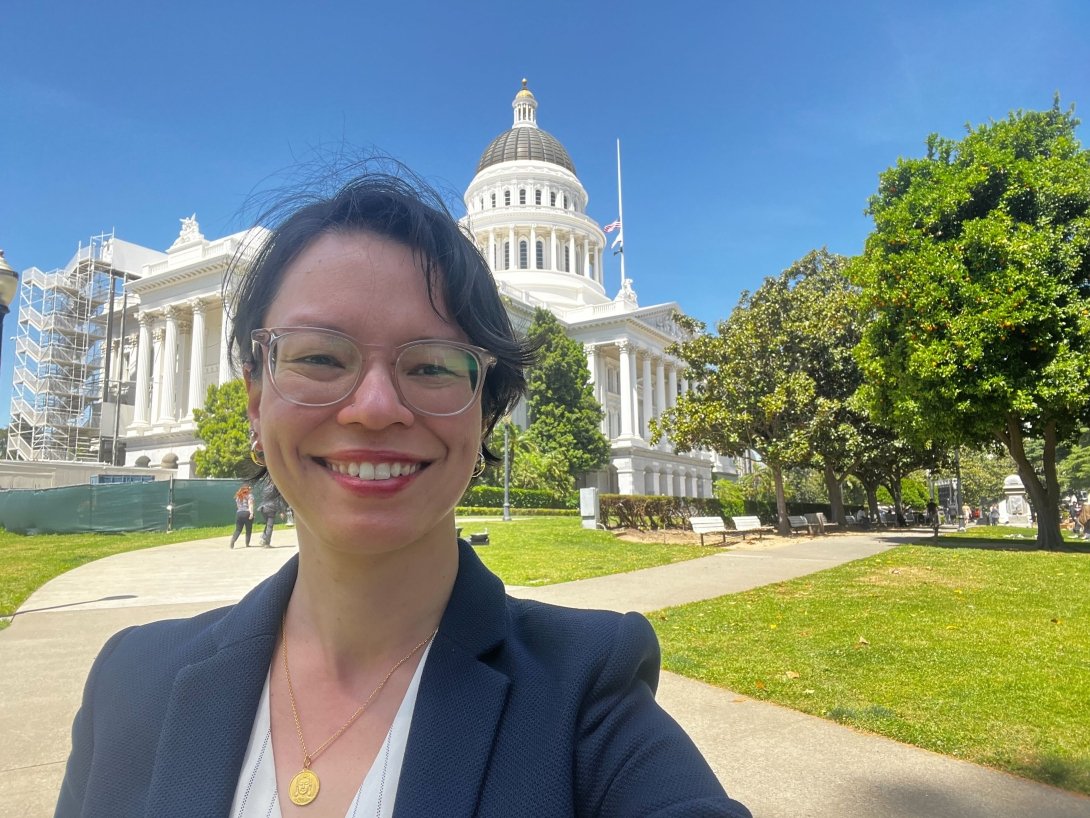
Free Press Action’s Qing Saville appeared at the California statehouse to support SB 1327.
On a brighter note, we stopped a terrible bill — the California Journalism Preservation Act — from moving forward. The CJPA would have rewarded the media conglomerates and hedge funds that have destroyed local news and made it harder for small community-centered newsrooms to survive. We worked with other advocacy groups, small publishers and community leaders to raise awareness about the bill’s many harms and prevented it from getting a vote. And on another bright note, Gov. Newsom signed into law a measure that takes first steps to boost state agencies’ advertising spending in outlets that serve diverse populations. Our ally Latino Media Collaborative advocated for this measure, which Free Press Action supported.
Moving forward, Free Press Action will continue to urge lawmakers in California and elsewhere to put community publishers, ethnic media outlets and nonprofit newsrooms at the center of any legislation.
This year, Free Press Action expanded its journalism-policy team and extended its policy work to the Great Lakes region, with an initial focus on Illinois and Wisconsin. In January, Journalism Program Manager Alex Frandsen took part in the press conference introducing a trio of promising journalism bills in Wisconsin. This legislation would support existing news outlets, sustain reporting jobs and invest in the future of media across the state. And in May, the Illinois legislature passed the Save Community Act, which included employment tax credits, scholarships for early-career journalists and transparency measures for out-of-state companies buying local-news outlets in the state. These proposals originated from a task force the legislature convened. Free Press Action staff were interviewed as part of the task force’s work and contributed research and analysis.
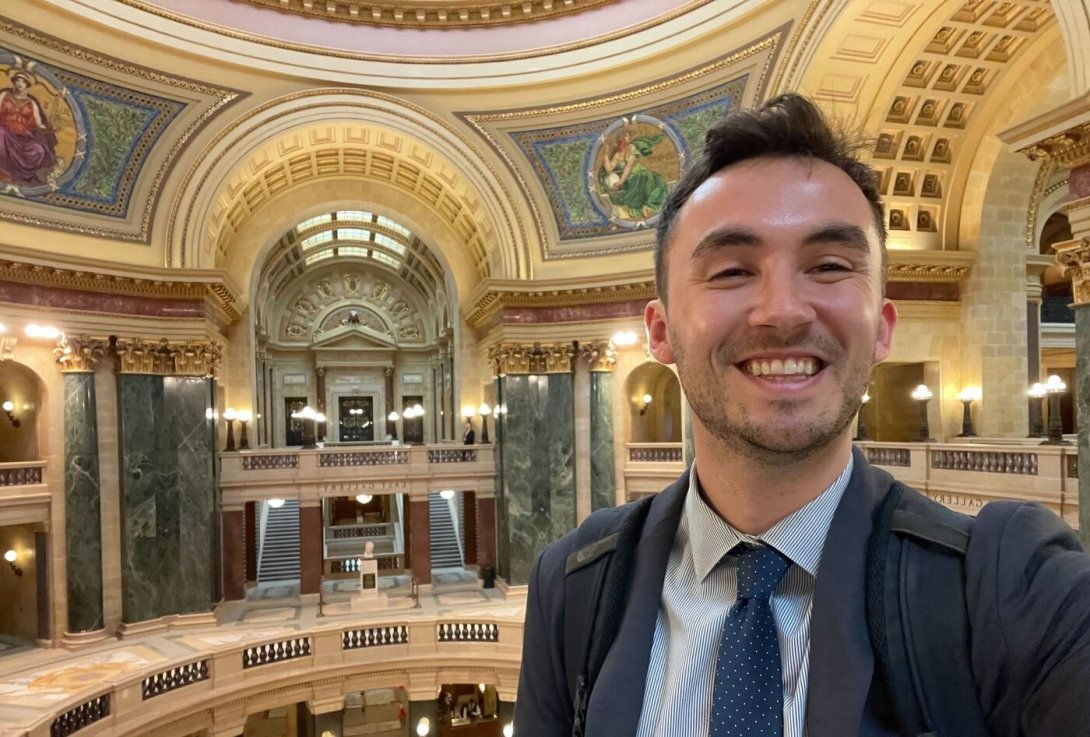
Free Press Action’s Alex Frandsen at the Wisconsin statehouse to celebrate the introduction of legislation designed to strengthen local journalism.
Since 2021, the New Jersey Civic Information Consortium — which we helped create and continue to help guide — has awarded grants to some 30 organizations focused on diversifying journalism, improving government transparency, providing community-health news and better serving communities of color and immigrant communities. Senior Director of Journalism and Civic Information Mike Rispoli serves on the consortium’s board, and News Voices Director Vanessa Maria Graber served earlier this year on the Strategic Planning Committee, which helped the nonprofit set a vision and priorities. The state allocated $3 million for the consortium in the 2025 budget. The consortium is also leading Press Forward NJ, the only publicly funded entity taking part in Press Forward, a national philanthropic effort to support local news.
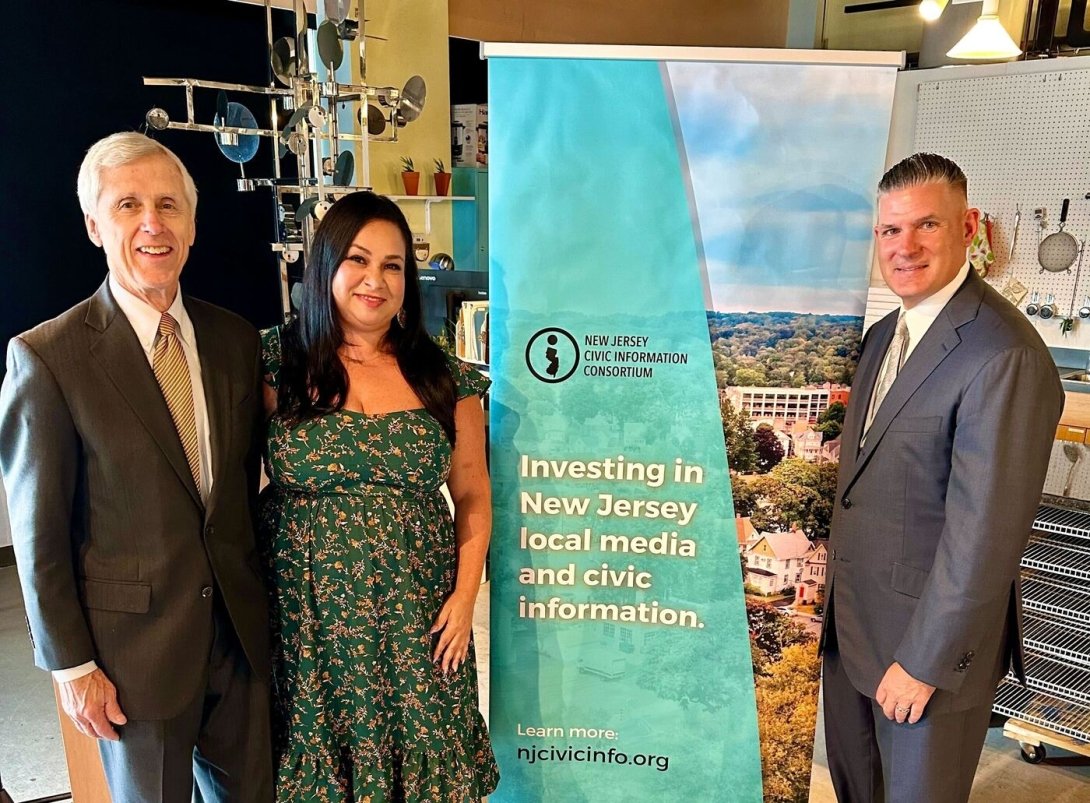
New Jersey Civic Information Consortium Interim Executive Director Chris Daggett, Free Press Action’s Vanessa Maria Graber and New Jersey Assembly Majority Leader Louis Greenwald, the primary sponsor of the bill that created the nonprofit
The Media Power Collaborative, which Free Press launched in 2022, brings together media workers, movement organizers and researchers to develop and win transformative journalism policies.
The MPC held a full slate of gatherings this year, including an International Labor Day event where panelists discussed how community members and journalism workers can collaborate to structurally transform local journalism. The network is also putting the final touches on a policy agenda that will guide its future work. A new policy tracker on the MPC website maps the bills under consideration in states across the country.
CREATING JUST AND EQUITABLE LOCAL NEWS
In Philadelphia, Free Press is working to transform coverage of public safety, crime and trauma. While speaking at the Crime Coverage Summit in January, News Voices: Philadelphia Program Manager Cassie Owens said, “While we as journalists often think of our work as neutral, the evidence is showing that the impacts on the communities and on the people in the stories are not actually neutral.”
In 2024, the News Voices team launched the Public Safety Coverage Cohort, a group of local journalists, media-makers and community organizers in Philadelphia that is working to change how we talk about public safety in the media. The group’s monthly meetings have included an ongoing harm-reduction series and a grief-care workshop with local storytellers. This workshop grew out of community gatherings News Voices held in 2023, where therapists and organizers noted that grief care could benefit community members experiencing harm from crime coverage. In 2024, News Voices also began a partnership with two local organizations invested in telling honest stories about youth in Philadelphia.
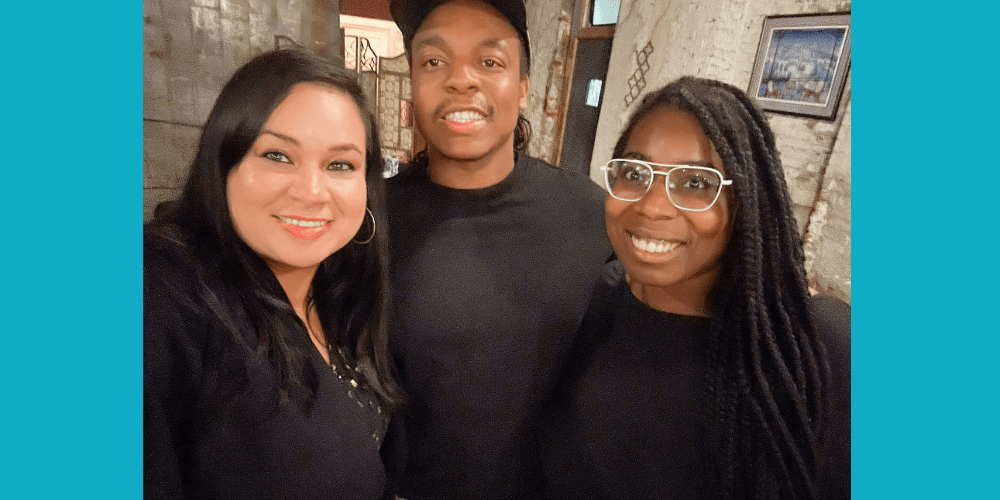
Free Press’ Vanessa Maria Graber (left) and Cassie Owens (right) with DayOneNotDayTwo Executive Director Andre Simms
Free Press began the Reparative Journalism Project in 2023 with an educational video that delved into the journalism industry’s history of harming Black and Indigenous communities. In April 2024, we released the second video in this series, “What Journalists Can Learn from Global Repair Movements,” which explores what reporters and storytellers can learn from movements that have responded to centuries of violence, theft and oppression. A third video in the series will be released later this year.
This year, the News Voices team launched the Civic Journalism Research Project, which will produce case studies of effective civic-media models. The result will be a guide that elevates best practices for civic media among newsrooms, promotes promising models and cultivates public support for quality local journalism.
News Voices Director Vanessa Maria Graber moderated a two-part panel discussion on environmental journalism that Free Press, the Center for Cooperative Media and the New Jersey League of Conservation Voters hosted. Participants heard from environmental-justice organizers and journalists about water and air-quality issues, flooding, natural disasters and how environmental racism impacts the health of New Jerseyans. Panelists shared information about potential policy solutions and discussed how journalists can be a force for good amid these challenges.
As our polling shows, daily Spanish speakers in the United States are concerned about the twin problems of dwindling local news and the prevalence of false information online. Through appearances at SRCCON and other conferences, Vanessa Maria is highlighting the need to give Latinx communities the trustworthy and accessible information they need about elections, government policies, public resources and other crucial matters.
PROTECTING PUBLIC MEDIA AND DIVERSIFYING MEDIA OWNERSHIP
Every couple of years, there are partisan attempts to root out alleged “bias” at NPR and PBS — which remain incredibly popular and trusted among the American public — and slash funding that supports local nonprofit radio and TV affiliates nationwide. In May, Free Press Action Co-CEO Craig Aaron testified before a House committee about the need to safeguard public media and reject these attacks. Defunding threats don’t just harm NPR executives — they endanger the work of more than 1,000 local radio stations providing essential information to communities large and small. His testimony helped NPR head off a funding threat.
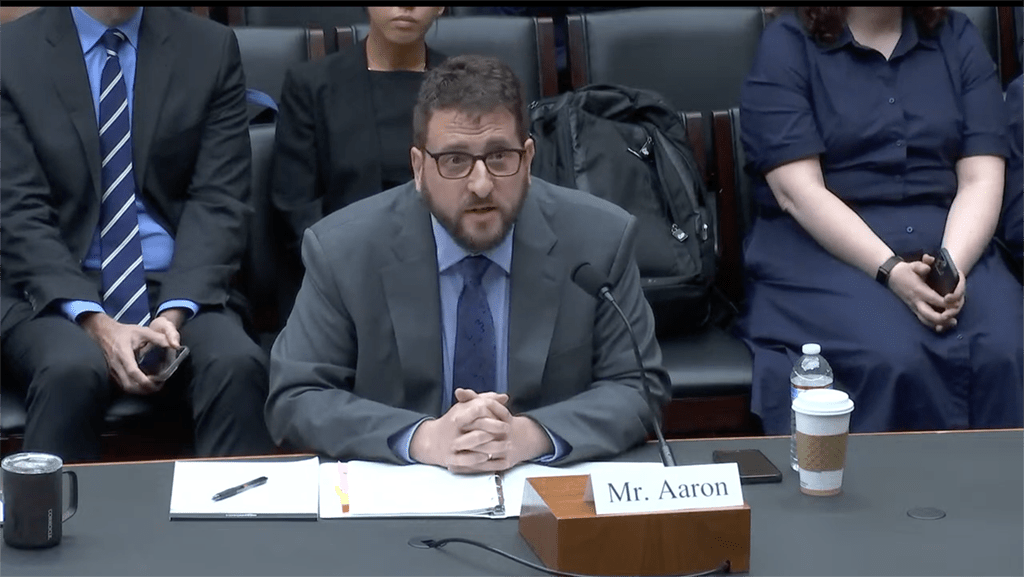
In testimony before the House, Free Press Action Co-CEO Craig Aaron urged lawmakers to protect funding for NPR.
In September, Free Press and several allies filed a brief defending the Federal Communications Commission’s broadcast-ownership rules against an industry challenge in the Eighth Circuit Court of Appeals. A series of deregulatory decisions the agency has made over the last two decades has significantly pared back these rules, which makes it even more crucial to preserve the remaining ones. “For broadcasting to remain a source of diverse and truly local content — serving populations that national and homogenized news sources so often ignore — the Federal Communications Commission must retain its rules preventing a single company from dominating the airwaves or owning quite literally every broadcast outlet in the same city,” said Vice President of Policy and General Counsel Matt Wood.
GETTING THE WORD OUT
We have had more than 2,000 press hits so far this year in outlets including The Associated Press, The Guardian, La Opinión, Mother Jones, The New York Times, The New Yorker, NBC News, NPR and The Washington Post. We’ve published 18 Op-Eds thus far in 2024 in outlets including CNN and The Seattle Times.
To join our community online and stay up to date on our work, you can follow Free Press on Bluesky, Facebook, Instagram, TikTok and Twitter.
FUND THE FIGHT
Your generosity makes our work possible. Please give what you can today to make sure we have the resources we need to push for equitable media and tech policies that improve people’s lives. We’re actively fundraising to meet our budget goals for this year and to ensure we’re here to fight for your rights to connect and communicate in the future. You can give with confidence knowing that Free Press does not accept money from business, government or political parties.

You can support us by making a one-time or monthly donation online or by mailing a check to P.O. Box 60238, Florence, MA 01062. You can also make a contribution through a donor-advised fund, a gift of stocks or securities, or a planned gift. For more information, please visit other ways to give or reach out to us.
Thank you!
Free Press and Free Press Action are nonpartisan organizations fighting for your rights to connect and communicate. Free Press and Free Press Action do not support or oppose any candidate for public office.